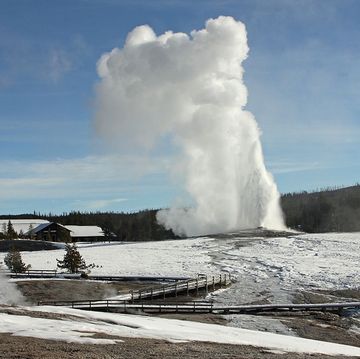The dangerous at-sea rescue of two parents, a 3-year-old, and an ill 1-year-old on a malfunctioning sailboat 900 miles off the Mexican coast sounded more like a Hollywood blockbuster than an actual event. But the harrowing adventure in recent weeks was real-life, and the family faced a veritable boatload of criticism from landlubbers once they reached the shore. The chief argument in all the internet-shaming: the couple was wildly negligent for attempting to travel across the Pacific Ocean with their little ones.
But what is a truly safe experience for children? How hard can you push them? To find the fine line between thrilling adventure and reckless peril, Men’s Health reached out to recreation and child development experts to find the best ways you can go out and experience the world with your kids.
Take a Hike
On a warm, sunny day, what could be better? Start this tradition with your kids as they begin walking, says Connie Magnuson, Ph.D, director of recreation studies at the University of Minnesota. Nature preserves are good places to start. As the kids age and become seasoned hikers, you can increase the duration and even start backpacking to more remote areas. Bring water on your walk, and let your child pick the trail you take and the direction you travel. This gives them ownership over your journey together.
Elevate your adventure: Mountain climbing can be appealing to teens. Make sure you receive the proper training before your trek, and explain to your kid that it’s okay if they fail to make it all the way up. Keep tabs on them throughout the climb, and let them know you’ll be honest if you think you cannot make it to the top, just as they should be with you. If your child does fail to reach the peak, say, "The fact that you put yourself out there is commendable,” Magnuson says. Then, head back down the mountain together.
Dare to Climb: Do what kids want to do naturally: climb! Choosing a facility where rock-climbing or tree-climbing instructors are present is the safest way to reach new heights. Keep the thrill and avoid the risk with harnesses and tethers—if your boy or girl falls, the only thing hurt will be their pride.
Elevate your adventure: Scale trees and rocks in Mother Nature’s playground, says Kathy Hirsh-Pasek, Ph.D, professor of psychology at Temple University. Just keep kids away from jagged edges and weak limbs, she says. Choose heights where falling would cause scrapes and bruises rather than a frantic rush to the ER.
Pitch a Tent
Sleeping on the ground may actually be rejuvenating for you and your child, Magnuson says. Camping is a great way for parents and kids to foster their relationship and to be unplugged from distracting technology or people. Letting your kids pick the day's outdoor activities will keep them entertained and foster decision-making skills.
Elevate your adventure: Plan a trip to a more remote location and rely more on nature than on items you bring. Try building a fire with as few tools as possible, and see if you can rely on your skills as a fisherman before tapping the food in the cooler. But testing your survival skills and pushing the boundaries a bit doesn’t mean you should abandon all precautions. Have emergency supplies and food on hand in case things don't work out as hoped.
Ride Some Rapids
Instead of lazily gliding down a river, let yourself be tossed around by some rapids. If you and your child are just learning, Magnuson suggests sticking to Class I or Class II rapids—they're less choppy and dangerous. It’s smart to ensure your young one knows how to swim, Magnuson says. (This is usually not required by all raft outfitters.) Your child should also be strong enough to be able to pull him or herself out of the water and back into the raft. If you want extra supervision while rafting, hire a guide to kayak alongside you or help you paddle.
Elevate your adventure: There are always bigger waves. If you and your kid are whitewater wizards, try a harder class of rapids. But don’t jump from Class I to Class VI (most safe to most dangerous). Increase classes gradually to ensure family time doesn’t capsize.
Tackle a 5K
Make sure your child is able to run or walk the distance without the pressure of an actual event. Choose a 5K with your child, perhaps one supporting a cause you both feel is important. Check in on your child throughout the trot. Ask them how they feel, and observe if they look out of breath or are sweating. Assure them that it’s okay to take a break.
Elevate your adventure: If 5Ks become too easy, consider a marathon. A 2010 study from the University of Minnesota found that over a 26-year period, 310 kids (ages 7-17) completed the Twin Cities Marathon. Of those, only four had to have postrace medical examinations. The kid’s relative risk of needing race-day medical care was less than adults. So, if you think your child is physically capable and mentally interested, let him or her take on a marathon using the same 5K precautions.
Go Geocaching
As kids, we all dreamed of discovering a hidden treasure. If you want to participate in a mission-like journey with your child, find a place that hosts “geocaching,” an activity where participants use GPS coordinates and their smartphones to guide them to a specific location. (Start at geocaching.com.) This treasure-map game is popular at state parks. When locating the secret spot, some sites offer prizes or ask participants to leave something at the treasure site for the next explorer. Let your kid be master of the GPS and tell you where to go.
Elevate your adventure: Certain geocaching events will be timed. If your navigating skills are worth bragging about, consider entering a competition. Kids in their teenage years particularly like the competitive aspect, Magnuson says.
Go International
This is a pretty big undertaking with a child in tow, but about 1.9 million American children travel abroad every year, according to the Center for Disease Control and Prevention (CDC). Check in with a doctor of travel medicine before going to any developing nation to ensure your child is appropriately vaccinated, they say. The biggest type of travel-related fatality in children is from car crashes, so bring a car seat from the States with you. (You may not be able to purchase quality seats where you’re going.) If you're not behind the wheel, let your driver know you are not in a hurry and that you will reward safe driving, suggests the American Academy of Pediatrics.
Elevate your adventure: If you really want to traverse the globe, leave western countries behind. Of course, it’s risky putting yourself in a situation—such as sailing—where you may need to be rescued if something unforeseen happens, or if you find yourself in a less-than-stellar hospital somewhere. Use judgment, and be ready for anything.
Before You Begin
Pick their brains: You can find out a lot about your child’s desires and interests by simply talking to them, Pasek says. “They’ll tell you what they enjoy,” she says. Even if they’ve never tried a certain activity, they probably already have a good understanding of the type of things they like. So, make time to chat with your child.
Share your passions: Tell your kids what you like to do, or share a story from your childhood. Say, “I used to like hiking with my Dad. Would you like to hike with me?” or “You know, I really like rafting and I thought you might like to do it with me.” Your child will most likely make it pretty clear if they think your idea of fun is a snooze-fest, says Hirsh-Pasek.
Challenge your child: When judging the success of your adventure, never go off of your child’s first experience, says Magnuson. They may like something more the second or third time. Encourage them to try again, but don’t force them, she says. Ask your child, “How can I help you do this?” says Hirsh-Pasek. That will give them confidence that you’re there as dependable support.
Understand their limitations: Not every child is on the same physical, mental, or emotional level, says Hirsh-Pasek, and age isn’t always an indicator of a child’s capabilities. Observe your unique boy or girl and build your engaging experiences around their skills.













